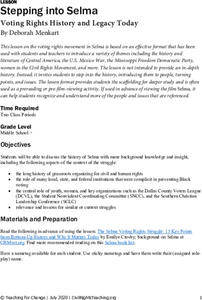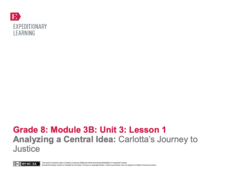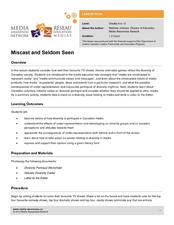Facing History and Ourselves
Protesting Discrimination in Bristol
Using the Bristol Bus Boycott as a case study, class members examine the strategies and levels of power protesters used to effect change. The two-day lesson concludes with individuals reflecting on the actions they might take in face of...
Just Health Action
Causes of the Causes: What Are the Root Causes of This Problem?
A "Causes of the Causes" diagram enables class members to examine the contributing factors to a problem. After reading a poem that models the process, class members, either in gorps or individually, diagram an issues they are passionate...
Facing History and Ourselves
The Legacies of Reconstruction
The final lesson in the seven-resource Reconstruction Era collection examines the legacies of Reconstruction. Class members investigate why the period has been called an "unfinished revolution," "a splendid failure," and "the second...
Just Health Action
Whose Backyard? Toxic Waste Management Meeting and Environmental Injustice
Toxic waste is a global problem. What to do with environmental hazards and where to put toxic waste is a global concern. To better understand current issues around toxic waste management and how current practices can lead to...
Teaching for Change
Stepping into Selma
The 1964 Selma to Montgomery, Alabama voting rights marches are the focus of a lesson designed to introduce learners to people who took part in the Civil Rights Movement. Class members set into the role of one of the participants,...
US Institute of Peace
Organizations Working for Peace
We're all in this together! Show young scholars that peace is a process and having the support of like-minded people can make it happen. 13th in a series of 15 peace building activities, groups conduct research on a peace organization,...
Teaching for Change
Selma in Pictures: Socratic Seminar
Photographs from the freedom movement in Selma, Alabama serve as the basis of two Socratic Seminars. Class members prepare for the seminars by closely observing the images, form a hypothesis, and use evidence from photo to support a...
C-SPAN
Last Days of Martin Luther King, Jr.
On April 4, 1968, Dr. Martin Luther King, Jr. was assassinated in Memphis, Tennessee. Four video clips reveal the events of that time, including the shift in the focus of the Civil Rights Movement, the aftermath of the assassination, and...
Museum of Tolerance
The Price of Personal Responsibility
A reading of Patrick Henry's "Speech in the Virginia Convention," Henry David Thoreau's "Civil Disobedience," and Rev. Martin Luther King, Jr.'s "Letter from Birmingham Jail" launch a discussion about the price one is willing to pay to...
Curated OER
Bias and Crime in Media
Critical thinking and social justice are central themes for this resource on bias and crime in media. The class views and discusses an incisive PSA that highlights assumptions based on race. Small groups read newspaper opinion pieces...
Pulitzer Center
"Voices from Haiti": Using Poetry to Speak up for a Cause
Explore a real world use of poetry with your class! Young language arts pupils consider the concept of advocacy and how journalism, photography, and poetry can raise awareness for a cause. They read several poems about individuals...
Learning to Live
Attributes of a Civil Society
What makes a society civil? High school freshmen search for examples of justice, kindness, peace, and tolerance in news media and brainstorm how they can promote these attributes in their schools, communities, and world. The well-rounded...
Facing History and Ourselves
Taking Ownership of the Law
The work of building and maintaining a democracy is, in the words of Justice William Hastie, "never finished." To better understand what Hastie sees as an ongoing building process, class members listen to a seven-minute podcast about two...
State Bar of Texas
Roe v. Wade
At what point does the right of privacy end and the government begin? Scholars research rights under the Ninth Amendment to the Constitution. Using the 1973 Roe v. Wade Supreme Court case as a starting point, along with small group work...
State Bar of Texas
Grutter v. Bollinger
A university decides not to allow a qualified scholar to enter its institution based on skin and gender—but this case is about a white female? The 2003 Supreme Court case Grutter v. Bollinger lays the foundation for open discussion and...
EngageNY
Analyzing a Central Idea: Carlotta’s Journey to Justice
Verbs are deceptive and like to disguise themselves. Young linguists identify verbals, specifically gerunds, infinitives, and participles when analyzing the third stage of Carlotta's journey in the novel A Mighty Long Way. Bridge...
Anti-Defamation League
Exploring Solutions to Address Radical Disparity Concerns
The deaths of Michael Brown, Eric Garner, and Tamir Rice, and the protests that followed the 2014 shootings, are the focus of a current-events activity that asks class members to brainstorm and research possible strategies to address the...
Curated OER
Miscast and Seldom Seen
Consider how well students' favorite TV shows, movies and video games reflect the diversity of society. The lesson introduces your class to several media literacy concepts, such as how media conveys values and messages, as well as the...
Heritage Foundation
Courts and Judges
If the Supreme Court is so supreme, why do all cases not just start there? High schoolers learn why every case does not start at the Supreme Court as well as the importance of hierarchy in the US judicial system in the 11th installment...
Facing History and Ourselves
The Political Struggle, 1865-1866
Healing versus justice. The central source of tension following the United States Civil War was between the demands for healing and the demands for justice, the battle between President Andrew Johnson and Congress. A video introduces the...
Facing History and Ourselves
Laws and the National Community
When it comes to the law, is justice always served? Teach scholars about how law sometimes enables prejudice of entire groups of people with a unit on World War II that includes a warm-up activity, analysis of primary sources,...
State Bar of Texas
Miranda v. Arizona
You have the right to remain silent—but why? Scholars analyze the nature of what has become known as the Miranda Rights. A short video along with paired group work and discussion opens the issue of the rights of the accused upon arrest....
Judicial Learning Center
About Federal Judges: Qualifications of Judges
"Help Wanted: A Supreme Court Justice." What should be included in the ad? Learners ponder the question during a lively activity that asks them to examine the qualifications for various federal offices and then create job postings....
iCivics
James Bond in a Honda? Trial Simulation
Your class members will take on the roles of jury members in this exciting simulation. After reading a detailed script and reviewing pieces of evidence, they will determine whether Honda violated copyright and copied James Bond.
Other popular searches
- And Social Justice
- Math and Social Justice
- Art and Social Justice
- Latino Social Justice
- Social Justice Lesson Plan
- Peace and Social Justice
- Music and Social Justice
- Rap and Social Justice
- Steps for Social Justice
- Economic and Social Justice
- Science and Social Justice
- Equality and Social Justice

























